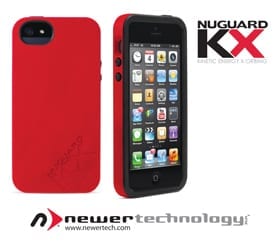
Buying a Mac is the right decision for lots of reasons. Apple builds its hardware to last, and OWC builds the upgrades, docks, storage, and more that makes that Mac run better and with the same lasting quality to be there for the long haul beside your Mac.
We provide technology to extend the life of your technology. We use technology to minimize our impact further and maximize the sustainability of everything we do. Being uncompromising in our choices, I believe we do provide the ultimate win-win-win that saves your money and time, and we do it in a way that also ensures we’re not harming our environment in the process. Quality that lasts reduces resource use and waste and saves you a lot of time and money in the long run. The sustainable choices we make may only be drops of water compared to the ocean. But that ocean is what all those drops combine to be.
Sometimes we have to look beyond convenience and think about the options we have. Plastic water bottles used to be my #1 target, and I am encouraged today by all the free refill stations now in airports, malls, government buildings, offices, etc. While marketing prowess is creating huge waste with the impact of a multi-billion dollar bottled water consumption industry, choices that are easy to make today can absolutely put an end to that waste.
Today, wireless charging is one of the things I hope we give a lot more thought.
For the past few years, wireless charging has become an ever-more-present and promoted technology for our convenience. This year at CES, a full-on wirelessly powered kitchen is on display in the passageway between exhibition halls. I am pleased to note that walking through this space isn’t going to get you zapped by power beams passing through your body. All wireless distance technologies are point-to-point directional, and they use sophisticated transmission and receiving coils and micro dishes that can only connect when unobstructed. Being able to power everything in your house wirelessly sounds great, but it is the far higher cost that comes with this convenience that raises the most significant concern.
However, before we get into the higher-power devices, let’s start by looking at the impact of the lower-power ones most widely used today – mobile devices.
All the latest mobiles can do near field “Qi” charging, and a decent charger achieves efficiencies of 60-75% in terms of power used, vs. 85-95% efficiency delivered by wired charging. Now, let’s be generous and assume that the AC to DC power adapter is 95% efficient, and the Qi charger is 75% efficient. Let’s also assume that the device is charged once a day on average for a year. That means we’re talking roughly 1.2 kilowatts of additional power consumption per year using wireless. Sure, it’s just pennies of waste, and wireless is convenient – but at what cost? It’s such a small impact each of us would have, but en masse, those drops add up. And not in a good way. Because if you multiply that 1.2 kW with the 13 billion mobile devices in the world today, it’s an additional 15.6 Gigawatts of waste – enough to power one million homes for a year.
Now, what about those higher-power devices like most things in your house? The expected efficiency of wireless point-to-point charging at a mere 6ft is about 10%. Imagine a world where the wireless consortiums have everything moving towards wireless power—kitchen appliances, TVs, lights, etc.—yet it makes us 1/10th as efficient on net? Now you’ve got me worried.
I do believe that Qi charging and other inductive/close proximity charging has its place. It can potentially save unnecessary material consumption by protecting sealed devices from the elements. Ideally, this extends their life and lowers the net cost/material impact when used with relatively low power consuming mobile devices, toothbrushes, etc. But when I see car brands trying to show up Tesla (which is all plug in, direct connect charging) with wireless/inductive charging solutions, I see only wasted energy. It defeats the benefits of the car being electric in the first place.
When I look at the new beamed charging technologies, I really worry. All the substantial efficiency gains we have made over the years with our appliances, light bulbs, etc., and now we’re going to use 100 Watts to sustain what less than 10 Watts would take via direct power?
We have many great conveniences today, so is it necessary or beneficial for wireless power to be one of them? Outside of sealed, low power devices where a physical connection would be a detriment, I would personally say no. The little things add up, and wireless charging could be an unneeded step back for a world trying to address its carbon footprint. Even if all your power comes from renewable sources, every extra watt you use from the grid is a watt that can’t replace conventional power somewhere else on the grid.
One day we’ll live in a world with an abundant, renewable, non-impactful energy supply. A world of incredible possibility where such abundance comes without cost to the world we live in and that will enable us to seek out and explore new worlds. I believe that and think we will get there. But until we do, and even if we do, I suggest questioning technologies that are there just for our convenience. Like the water bottle, they often come with little short term benefit while having a myriad of impactful, long term costs.
When the world achieves an abundance of 100% clean power, I will be the first to cheer for wireless everywhere!
~ OWC Larry









This is excellent insight, and a consideration that will NOT be covered in the marketing materials. And sadly because the individual impact IS pennies, there won’t be a public wondering of “Why did my electric bill go UP when I bought all these cool wireless chargers/devices?”
Larry
You are absolutely correct. However, someone like me has solar panels on their home and I try not to exceed the generation of the panels. This means even though I waste some power internally, it is renewable sun power. I try to minimize the power consumed.
On the plastic bottles, if the idiots that use them would properly recycle them so they don’t end up in our environment we wouldn’t have oceans full of crap. I NEVER throw anything out my window or off a boat or away externally. I ALWAYS dispose of waste in a bag and make sure the bag gets into the proper garbage container.
It makes me sick when I see trucks and open flatbed vehicles driving on our roads and scrapes of stuff flying out of them onto our hi ways. It happens all too often. It is the few that are causing a big problem for our environment. It doesn’t take too many to make a mess of things. In Hawaii children have gotten their feet burned by people disposing of HOT coals in our beach sand!!
Also we MUST get rid of gas cars. Too many of them are polluting our air. And airplanes are crazy thick in our skies. Take a look at the air travel website showing planes in the sky. That will just blow you away.
I tried a Ubio Labs Qi charger from Costco on my iPhone 8 and ended up dumping it. Their transformer was loud and my iPhone got hot. I didn’t have that problem with the small Apple charger. I now have an iPhone 11 with the higher amperage charger and that doesn’t get my iPhone hot either. Sometimes progress doesn’t actually benefit you. I hope Apple keeps the lightning port for charging and other things.
The more immediate concern for consumers than energy inefficiency should be the now settled issue of radiation effects on living cells and organisms. The Wireless Industry is copying directly from the pages of Big Tobacco and Big Oil how to obfuscate scientific data. By funding highly questionable studies that only get published if they agree with the funder’s goals, the Science is ‘unsettled’, or ‘arguable’, all it takes to paralyze legislatures, or influence most consumer’s choices. The effects of 4G radiation at currently legal powers, and not-unrealistic exposures, are shown robustly by current peer reviewed work to be dangerous. (https://www.theguardian.com/technology/2018/jul/14/mobile-phones-cancer-inconvenient-truths) The coming 5G coverage necessary for the IOT is likely to be an order of magnitude greater radiation exposure, to Everyone, of all ages (Infants and children are far more vulnerable) whether they opt to use or own wireless devices or not. Spaced roughly every 100 yards over all urban areas of the planet will be unprecedentedly powerful cell towers, as the 5G radiation is a higher frequency band in order to handle the data rate, and so is far less ‘receivable’ at distances we are used to for 4G devices.
On average, I find that a Lightning charging cable has to be replaced about every 6-12 months. So you should add in the environmental cost of making /shipping a new one.
Good article except for the kW vs kWh.
The main reason I use wireless on my iPhones is because the battery cases I use have micro USB connectors which always fail after a few months. What is needed is a more reliable, more durable standardized connector. Think of how many devices, chargers, and cords are thrown in the landfill because of these cheap connectors.
It’s good to see someone thinking, rather than just embracing all the new stuff just because it’s new. As an engineer, I can appreciate your analysis, and I have thought for some time that the rush to “smart homes” is senseless, and has a lot of baggage.
Thanks for injecting some intelligence into the discussion.
Excellent! I’ve been telling people this but have not tried to do the math. Now that you have I’m going to borrow this.
Be careful when using kilowatts for power when you probably mean kilowatt-hours for energy. One is a rate, the other is a total.
We pay for energy we use in kwhr, but the rate at which we consume it is power, measured in kilowatts (kw).
It’s not pedantry. It’s like confusing ram with Hard drives on a computer. They seem similar, but they are not.
A distinction without a difference. A rate for the time we all know it takes to charge any particular device, is a total.
We are destroying planet Earth and nobody seems to care. Wireless charging is a waste of energy. Wired whatever is much better than wireless whenever possible for anything, including also keyboards and mice. Batteries are obnoxious to the environment, besides much less convenient (for instance, less responsive) and a pain to recharge routinely.
You raise a highly valid point that, unfortunately, will be largely ignored by the consuming public, and totally ignored by those manufacturing and pushing the technology of wireless power. Nicolai Tesla’s dream is becoming reality, but at a cost he would consider stupid.
Right on brother